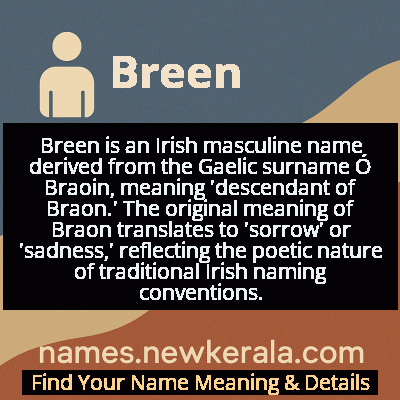Breen Name Meaning & Details
Origin, Popularity, Numerology Analysis & Name Meaning of Breen
Discover the origin, meaning, and cultural significance of the name BREEN. Delve into its historical roots and explore the lasting impact it has had on communities and traditions.
Name
Breen
Gender
Male
Origin
Irish
Lucky Number
8
Meaning of the Name - Breen
Breen is an Irish masculine name derived from the Gaelic surname Ó Braoin, meaning 'descendant of Braon.' The original meaning of Braon translates to 'sorrow' or 'sadness,' reflecting the poetic nature of traditional Irish naming conventions.
Breen - Complete Numerology Analysis
Your Numerology Number
Based on Pythagorean Numerology System
Ruling Planet
Saturn
Positive Nature
Ambitious, efficient, realistic, and authoritative.
Negative Traits
Materialistic, stressed, confrontational, and can be overly ambitious.
Lucky Colours
Dark blue, black.
Lucky Days
Saturday.
Lucky Stones
Blue sapphire, amethyst.
Harmony Numbers
2, 4, 6.
Best Suited Professions
Business leaders, managers, financial services, law enforcement.
What People Like About You
Leadership, determination, organizational skills.
Famous People Named Breen
John Breen
Playwright
Irish playwright known for 'Alone It Stands' about the 1978 Munster rugby team
Joseph Breen
Film Censor
Director of the Motion Picture Production Code that regulated Hollywood content from 1934-1954
Billy Breen
Musician
Australian musician and member of the band Something for Kate
Michael Breen
Journalist/Author
British journalist and author specializing in Korean affairs and Asian politics
Name Variations & International Equivalents
Click on blue names to explore their detailed meanings. Gray names with will be available soon.
Cultural & Historical Significance
Throughout Irish literary tradition, names with sorrowful meanings often symbolize depth of character and resilience, qualities highly valued in Celtic culture. The Breen name represents the enduring spirit of Irish families who maintained their identity through centuries of political and social challenges. In modern times, the name continues to serve as a connection to Irish heritage for diaspora communities, while its distinctive sound and meaningful background have contributed to its occasional use as a given name beyond its traditional surname usage.
Extended Personality Analysis
Individuals named Breen are often perceived as deeply thoughtful and introspective, possessing a natural empathy that allows them to connect with others on an emotional level. Their name's association with sadness doesn't indicate perpetual melancholy but rather suggests a capacity for profound understanding of life's complexities. Breens tend to be observant and perceptive, often noticing subtleties that others miss, which makes them excellent listeners and trusted confidants. They typically exhibit strong loyalty to family and close friends, valuing deep, meaningful relationships over superficial connections.
While they may have a serious demeanor, this often masks a dry wit and intelligent humor that emerges in comfortable settings. Their emotional depth frequently translates into creative expression, whether through arts, writing, or music, and they approach challenges with quiet determination rather than loud confrontation. Breens are often drawn to professions that allow them to help others or express complex ideas, such as counseling, teaching, writing, or artistic pursuits. Their combination of sensitivity and resilience makes them particularly adept at navigating difficult situations with grace and wisdom.
Modern Usage & Popularity
In contemporary usage, Breen remains primarily a surname but has gained some popularity as a distinctive given name, particularly in Ireland and among Irish diaspora communities. Its usage as a first name has seen a gradual increase in recent decades, appealing to parents seeking unique yet culturally grounded names that stand out from more common Irish names. The name maintains strong connections to Irish heritage while offering a modern, unisex quality that fits current naming trends. While not among the most common names, Breen appears with moderate frequency in English-speaking countries, often chosen by families with Irish ancestry wanting to honor their roots. Its simplicity and strong phonetic quality make it memorable without being overly complicated, contributing to its steady, if niche, popularity in naming circles.
Symbolic & Spiritual Meanings
Symbolically, Breen represents emotional depth and resilience born from understanding life's sorrows. The name embodies the Celtic philosophical tradition that values emotional authenticity and the wisdom gained through experiencing hardship. Like the morning dew (another meaning of 'braon') that nourishes growth while reflecting transient beauty, Breen symbolizes the capacity to find strength and renewal in challenging circumstances. It carries connotations of sensitivity and perception—the ability to see beneath surface appearances to deeper truths. In metaphorical terms, Breen suggests the richness that comes from embracing the full spectrum of human emotion rather than avoiding difficult feelings. The name represents the idea that true strength includes vulnerability and that the most profound insights often emerge from contemplative, sometimes sorrowful, reflection on life's experiences.

